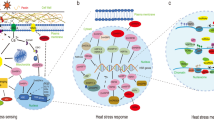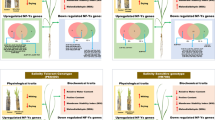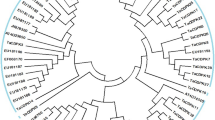Abstract
Expression profiles of 12 class A rice heat shock transcription factor genes (OsHsfAs) were analyzed by semi-quantitative reverse transcriptase polymerase chain reaction. The OsHsfA genes exhibited tissue-specific expressions under normal condition. OsHsfA1a, A2d, and A9 were predominantly expressed in young spike. Expression responses of the 12 OsHsfAs under abiotic stresses were analyzed in the shoots of rice seedling. Most OsHsfA genes responded quickly to heat stress except for OsHsfA1a, A3, and A9 which were almost unaffected. In particular, OsHsfA2a expression in response to heat stress was highest among the heat shock factors examined. However, the majority of the increased OsHsfAs expression responses to salt, polyethylene glycol (PEG), and cold treatments primarily occurred during the later stages (3 to 24 h) of stress exposure. Furthermore, most of OsHsfA gene expressions were little affected and only a few (OsHsfA3, A4d, A7, and A9) genes had slow responses to cold treatment. The results indicate that the transcript levels of OsHsfAs during heat stress exposure were distinct from those of plants subjected to salt, PEG, and cold stresses, suggesting that there might be different regulatory networks between heat and non-heat stress.





Similar content being viewed by others
References
Almoguera C, Rojas A, Diaz-Martin J, Prieto-Dapena P, Carranco R, Jordano J (2002) A seed-specific heat-shock transcription factor involved in developmental regulation during embryogenesis in sunflower. J Biol Chem 277:43866–43872
Hartl FU, Hayer-Hartl M (2002) Molecular chaperones in the cytosol: from nascent chain to folded protein. Science 295:1852–1858
Hu WH, Hu GC, Han B (2009) Genome-wide survey and expression profiling of heat shock proteins and heat shock factors revealed overlapped and stress specific response under abiotic stresses in rice. Plant Sci 176:583–590
IPCC (2001) Summary for policy makers In: Climate change. The scientific basis. Cambridge University Press:13
Koo HJ, Xia X, Hong CB (2003) Genes and expression pattern of tobacco mitochondrial small heat shock protein under high temperature stress. J Plant Biol 46:204–210
Kotak S, Port M, Ganguli A, Bicker F, von Koskull-Döring P (2004) Characterization of C-terminal domains of Arabidopsis heat stress transcription factors (Hsf) and identification of a new signature combination of plant class A Hsfs with AHA and NES motifs essential for activator function and intracellular localization. Plant J 39:98–112
Kotak S, Vierling E, Bäumlein H, von Koskull-Döring P (2007) A novel transcriptional cascade regulating expression of heat stress proteins during seed development of Arabidopsis. Plant Cell 19:182–195
Li HY, Chang CS, Lu LS, Liu CA, Chan MT, Charng YY (2003) Over-expression of Arabidopsis thaliana heat shock factor gene (AtHsfA1b) enhances chilling tolerance in transgenic tomato. Bot Bull Acad Sin 44:129–140
Li CG, Chen QJ, Gao XQ, Qi BS, Chen NZ, Xu SM, Chen J, Wang XC (2005) AtHsfA2 modulates expression of stress responsive genes and enhances tolerance to heat and oxidative stress in Arabidopsis. Sci China C Life Sci 48:540–550
Liu JG, Yao QH, Zhang Z, Peng RH, Xiong AS, Xu F, Zhu H (2005) Isolation and characterization of a cDNA encoding two novel heat-shock factor OsHSF6 and OsHSF12 in Oryza sativa L. J Biochem Mol Biol 38(5):602–608
Liu JG, Qin QL, Zhang Z, Peng RH, Xiong AS, Chen JM, Yao QH (2009) OsHSF7 gene in rice, Oryza sativa L., encodes a transcription factor that functions as a high temperature receptive and responsive factor. BMB Rep\ 42(1):16–21
Lohmann C, Eggers-Schumacher G, Wunderlich M, Schöffl F (2004) Two different heat shock factors regulate immediate early expression of stress genes in Arabidopsis. Mol Genet Genomics 271:11–21
Miller G, Mittler R (2006) Could heat shock transcription factors function as hydrogen peroxide sensors in plants? Ann Bot 98:279–288
Mishra SK, Tripp J, Winkelhaus S, Tschiersch B, Theres K, Nover L, Scharf KD (2002) In the complex family of heat stress transcription factors, HsfA1 has a unique role as master regulator of thermotolerance in tomato. Genes Dev 16:1555–1567
Nishizawa A, Yabuta Y, Yoshida E, Maruta T, Yoshimura K, Shigeoka S (2006) Arabidopsis heat shock transcription factor A2 as a key regulator in response to several types of environmental stress. Plant J 48:535–547
Nover L, Bharti K, Doring P, Mishra SK, Ganguli A, Scharf KD (2001) Arabidopsis and the heat stress transcription factor world: how many heat stress transcription factors do we need? Cell Stress Chaperon 6:177–189
Ogawa D, Yamaguchi K, Nishiuchi T (2007) High-level overexpression of the Arabidopsis HsfA2 gene confers not only increased themotolerance but also salt/osmotic stress tolerance and enhanced callus growth. J Exp Bot 58(12):3373–3383
Peng S, Huang J, Sheehy JE, Laza RC, Visperas RM, Zhong X, Centeno GS, Khush GS, Cassman KG (2004) Rice yields decline with higher night temperature from global warming. Proc Natl Acad Sci USA 101:9971–9975
Pnueli L, Hongjian L, Mittler R (2003) Growth suppression, altered stomatal responses, and augmented induction of heat shock proteins in cytosolic ascorbate peroxidase (Apx1)-deficient Arabidopsis plants. Plant J 34:187–203
Port M, Tripp J, Zielinski D, Weber C, Heerklotz D, Winkelhaus S, Bubla KD, Scharf KD (2004) Role of Hsp17.4-CII as coregulator and cytoplasmic retention factor of tomato heat stress transcription factor HsfA2. Plant Physiol 135:1457–1470
Rizhsky L, Liang HJ, Shuman J, Shulaev V, Davletova S, Mittler R (2004) When defense pathways collide. The response of Arabidopsis to a combination of drought and heat stress. Plant Physiol 134:1683–1696
Scharf KD, Heider H, HÖhfeld I, Lyck R, Schmidt E, Nover L (1998) The tomato Hsf system: HsfA2 needs interaction with HsfA1 for efficient nuclear import and may be localized in cytoplasmic heat stress granules. Mol Cell Bio 18:2240–2251
Sung DY, Vierling E, Guy CL (2001) Comprehensive expression profile analysis of the Arabidopsis Hsp70 gene family. Plant Physiol 126:789–800
Swindell WR, Huebner M, Weber AP (2007) Transcriptional profiling of Arabidopsis heat shock proteins and transcription factors reveals extensive overlap between heat and non-heat stress response pathways. BMC Genomics 8:125
Verslues PE, Agarwal M, Katiyar-Agarway S, Zhu JH, Zhu JK (2006) Methods and concepts in quantifying resistance to drought, salt and freezing abiotic stresses that affect plant water status. Plant J 45:523–539
Wu C (1995) Heat stress transcription factors: structure and regulation. Annu Rev Cell Dev Biol 11:441–469
Yamanouchi U, Yano M, Lin H, Ashikari M, Yamada K (2002) A rice spotted leaf gene, Spl7, encodes a heat stress transcription factor protein. Proc Natl Acad Sci USA 99(11):7530–7535
Yokotani N, Ichikawa T, Kondou Y, Matsui M, Hirochika H, Iwabuchi M, Oda K (2008) Expression of rice heat stress transcription factor OsHsfA2e enhances tolerance to environmental stresses in transgenic Arabidopsis. Planta 227(5):957–967
Zhu B, Ye C, Lü H, Chen X, Chai G, Chen J, Wang C (2006) Identification and characterization of a novel heat shock transcription factor gene, GmHsfA1, in soybeans (Glycine max). J Plant Res 119:247–256
Zou J, Liu AL, Chen XB, Zhou XY, Gao GF, Wang WF, Zhang XW (2009) Expression analysis of nine rice heat shock protein genes under abiotic stresses and ABA treatment. J Plant Physiol 166:851–861
Acknowledgments
This study was supported by National Basic Research Program of China (no. 2007CB116207), NSF of China (no. 30870206), Specialized Research Fund for the Doctoral Program of Higher Education of China (no. 20050537001), Special Key Science and Technology Project of Hunan Province (no. 2009FJ1004-1), and Provincial Youth Foundation of Hunan (no. 09B045).
Author information
Authors and Affiliations
Corresponding author
Rights and permissions
About this article
Cite this article
Liu, AL., Zou, J., Zhang, XW. et al. Expression Profiles of Class A Rice Heat Shock Transcription Factor Genes Under Abiotic Stresses. J. Plant Biol. 53, 142–149 (2010). https://doi.org/10.1007/s12374-010-9099-6
Received:
Revised:
Accepted:
Published:
Issue Date:
DOI: https://doi.org/10.1007/s12374-010-9099-6




